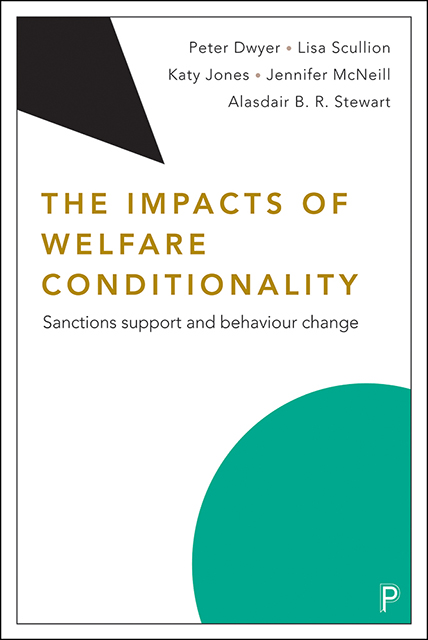Book contents
- Frontmatter
- Contents
- List of figures and tables
- List of abbreviations
- About the authors
- Acknowledgements
- One Introduction
- Two Conditionality in the UK welfare state
- Three Welfare conditionality and behaviour change
- Four From welfare to work? The effectiveness of welfare conditionality in moving people into paid employment
- Five Welfare conditionality and problematic or antisocial behaviour
- Six Unintended outcomes? The wider impacts of compulsion and benefit sanctions in social security
- Seven Ethical debates
- Eight Conclusions
- Methods appendix
- References
- Index
Three - Welfare conditionality and behaviour change
Published online by Cambridge University Press: 17 June 2023
- Frontmatter
- Contents
- List of figures and tables
- List of abbreviations
- About the authors
- Acknowledgements
- One Introduction
- Two Conditionality in the UK welfare state
- Three Welfare conditionality and behaviour change
- Four From welfare to work? The effectiveness of welfare conditionality in moving people into paid employment
- Five Welfare conditionality and problematic or antisocial behaviour
- Six Unintended outcomes? The wider impacts of compulsion and benefit sanctions in social security
- Seven Ethical debates
- Eight Conclusions
- Methods appendix
- References
- Index
Summary
Powerful actors and institutions have long sought to make people behave in specific ways. Within feudal societies, nascent forms of the state were designed to deliver a monarch’s bidding and the threat or use of violence was a key tool in getting subjects to obey the sovereign power. Although retaining a monopoly on the legitimate use of force remains a defining element of the modern state, today, democratically elected governments tend to look beyond brute force and employ a range of techniques and tools to persuade citizens to act in particular ways (Kelly, 2016). Questions about how to make individual citizens behave more responsibly, particularly in relation to public health and environmental concerns, have become a more prominent concern within public policy in recent decades (Collins et al, 2003: 6 et al, 2010; Spotswood, 2016). As Kelly (2016: 11) describes: ‘Behaviour change is usually about making people different from how they are now.’ Policymakers use a range of tools to variously incentivise, persuade, cajole and compel people to behave in prescribed ways regarded as beneficial for the individual concerned and wider society.
This chapter explores how highly conditional welfare interventions are now regarded as important instruments of behaviour change by many governments. The first part of the chapter offers an initial brief overview of broader economic and psychological theories on behaviour change that have held sway within social science and continue to heavily influence the thinking of contemporary policymakers. In the second part, a consideration of how agency and behaviour have been conceptualised within the welfare conditionality literature and the relevance of different policy tools (that is, sanction, support, sermons and nudges) that policymakers have at their disposal when attempting to change the behaviour of those reliant on social welfare benefits and services is then offered. The third part reviews existing evidence on the effectiveness of welfare conditionality, in either moving those reliant on social welfare benefits into paid work or promoting the cessation of problematic behaviour among sections of the population.
Theorising behaviour change
The literature theorising human behaviour and the various models for understanding and generating behaviour change is vast.
- Type
- Chapter
- Information
- The Impacts of Welfare ConditionalitySanctions Support and Behaviour Change, pp. 48 - 67Publisher: Bristol University PressPrint publication year: 2022



